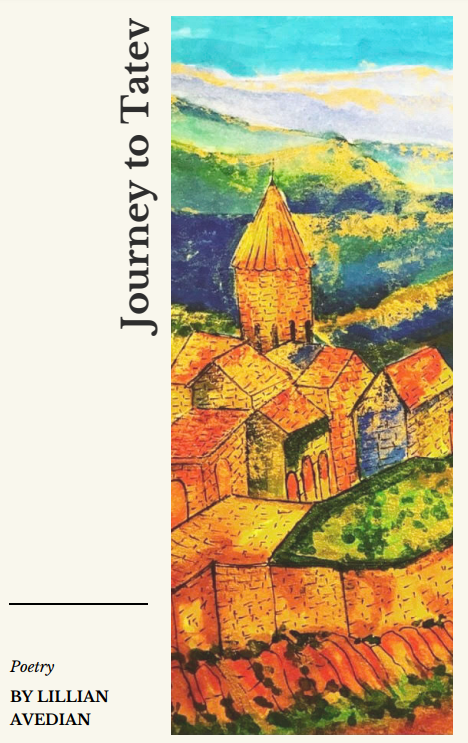 Reviewed by Magdalena Ball
Reviewed by Magdalena Ball
Journey to Tatev
By Lillian Avedian
Girls on Key Press
April 2021, paperback, $20aud, 141pages
Lillian Avedian’s work takes the distinctive perspective of an Armenian American who grew up in California attending Armenian-only schools. The poems in her debut poetry book Journey to Tatev are evocative. Tatev is a village in Armenia built around a 9th century monastery and also functions as a station on the the world’s longest aerial tramway called the Wings of Tatev. The book contains 56 numbered poems, using their first line as the title, Emily Dickinson style. There is a sense of journey in all of the poems – often a metaphoric one, but the first poem in the collection is about a physical journey – perhaps to a former family home in Yerevan, the capital of Armenia:
the wheels on the bus turn us to the left towards the sunrise
My mother clutches my hand
no need to be afraid, Mom, we will make it there in time.
There are lines on her face where years of travel
and migration and work and children
have slid charcoal pencils across her skin.
There’s an intimate connection made in this book between daughter, mother and grandmother, through time and space, converging tradition and modernity, constriction and expansion, the old and the new. The grandmother’s journey aligns with the daughters, physical with emotional. Avedian has a rich turn of phrase: “The mantel of the earth is composed of the richest ink.”
Words spread themselves across the page, detaching from sentences, dispersing, and exploring new ways of communicating. Avedian intersperses Armenian words and poems, playing the “mother tongue” off English in exuberant ways:
It is my birthright to question the universe
lifelong celestial navigations mapped
by tattered pages of worn books
Many of the poems also explore a non heteronormative mode of expression, situating identity at the nexus of desire and transformation, both in the sense of coming out, and a rejection of a the shame, constriction and structure perpetuated by the parental and societal voice of disapproval:
(between a man and a woman
whispers in the morning.
A continual theme throughout the book is the way in which writing can evoke the mystical: “paper trees rise and mechanical larks sing”. The poems grow from a place of longing and physical awakening, interrogating the notion of ‘otherness’ through a range of linguistic devices – musical notes, sound, and rhythm. Words wind themselves around the page, dissolve, break open, slide and dance (“free of insecurity and dread”), language as catalyst:
Surrendering everything
Standing in cavern built by my own knuckles
I give you papers and clips and ink
In a floating bundle
The book comes full circle, with the later poems returning to tradition through food – Nazouk pastry and other foods from the homeland – candied apricots, walnuts, plum paste, apples, pears grapes. It is a sensual return enriched by a growing self-awareness and freedom, and softened by the mother’s acceptance: “Jigaars, know the I will always accept you as you are”. Journey to Tatev is a love poem to the self and to the other, written along the trajectory of a single journey. These airy, deeply rhythmic poems encompass the multi-lingual voice of a migrant, coming-of-age, coming out, coming to terms with the past and future simultaneously. Words and notes dance across the page, engaging all of the senses in this vibrant and deeply moving collection.